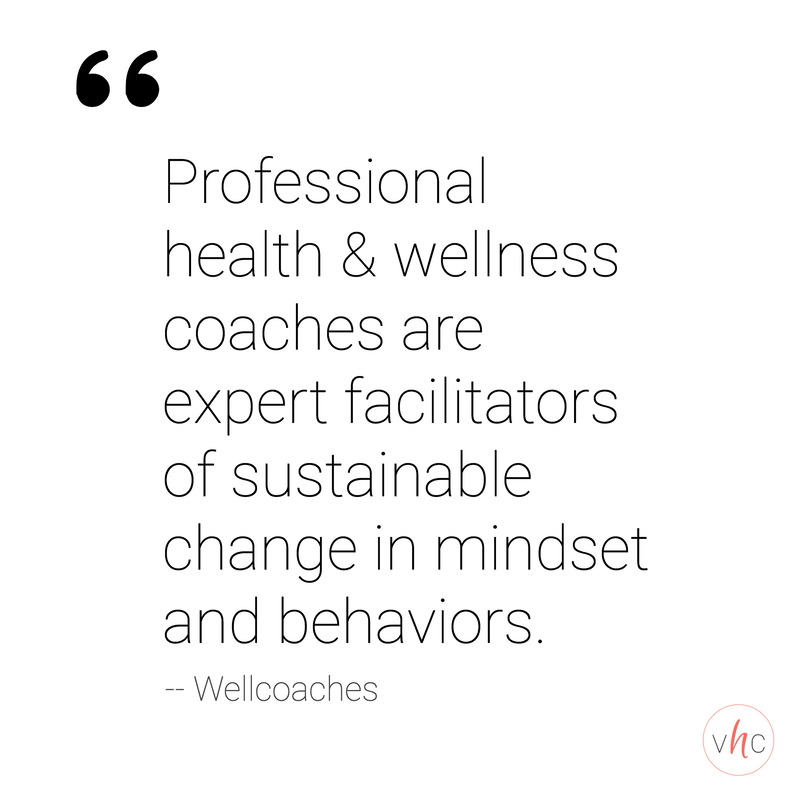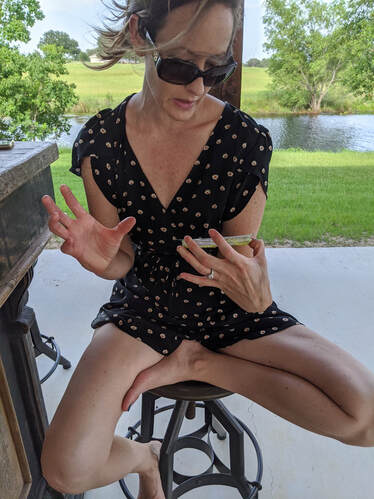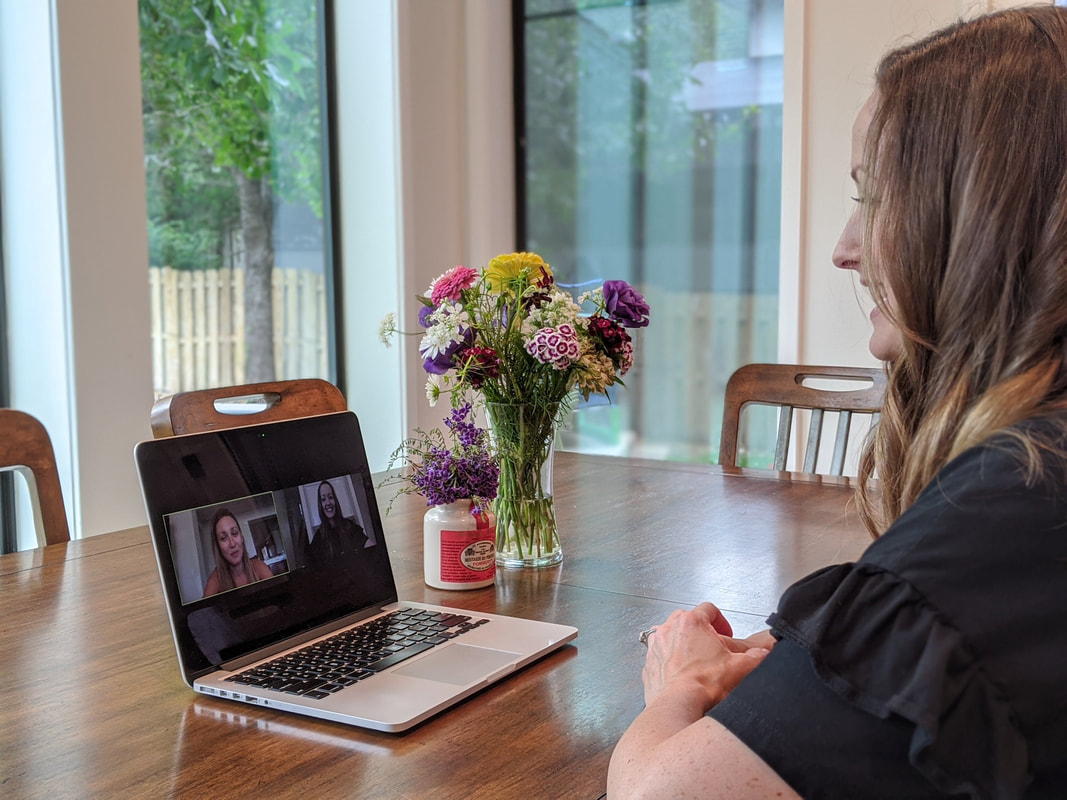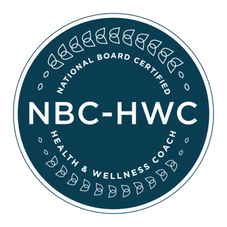|
In a word, no. This is a common misconception, one which I used to have myself. As disease prevention and wellness promotion has surged in the past decade, nutrition—a major component of wellness—has been in the spotlight with medical professionals, researchers, health enthusiasts, and even the general public. As the use of food as medicine has advanced, so have the self-proclaimed “nutrition experts,” many of whom also go by the title “health coach.” the regulations are lackingBoth professional titles (health coach and nutritionist) lack adequate regulations and licensure.
Confusing, right? To be honest, I was about halfway through my coach training at Duke Integrative Medicine before I had my “ah-ha!” moment about what health & wellness coaching is. I had enrolled thinking I would learn how to coach people on eating better and exercising. I would tell my clients everything they need to know to turn their health around and live in a world of wellness. I could not have been more wrong! Coaching is a complete 180 from what I thought. It is such a new and quickly emerging profession that most people (even in the medical world) don’t know what coaches actually do!  Health coaches often do work with clients on changing their diet, but they are not specifically trained as a nutritionist. A health coach is focused on the process of behavior change, not determining what that behavior change needs to be. Many health coaches are passionate about nutrition and build their practice around counseling people on dietary topics. Some have related training in nutrition and some don’t. Technically, unless a heath coach is a registered dietician, a coach providing specific nutrition advice for an individual is acting out of scope. There is a lot of gray area with scope of practice in both the nutrition and health coaching domains, so much that most people in the industry don’t clearly understand the boundaries! What is a nutritionist? A nutritionist is probably the first title that comes to mind when you feel like you could use some help with your diet. What most people don’t realize is the title is up for grabs in many states... anyone can label themselves a nutritionist and hang a shingle. The rules and regulations are a bit vague and vary widely from state to state. For more information about the regulations in your state, the map on this page is helpful. If you are looking for general counseling on nutrition, the training (or lack thereof) your nutritionist has may not even be relevant. Let’s say, for example, you want new ideas on how to add more variety to your diet, or you want to explore new sources of protein...you’re not trying to prevent or address disease, you essentially want a human cookbook! In such instances, you’ll likely fare well with anyone who is simply knowledgeable about food and nutrition. A nutritionist’s training could range from none, or a very basic internet self-study course to a Master’s or even PhD in Nutrition. There are many nutrition related credentials out there—some are meaningful, others are not. When you find a nutritionist that you want to work with, take your time to dig into their credentials to determine if their training is appropriate to address your particular needs. What about using food as medicine? As a health coach, I’m thrilled when people want to take an active role in their health, addressing issues through diet and lifestyle changes! There is a lot of research about the role of proper nutrition in addressing or preventing disease, so you’re on the right track. According to Stanford Medicine’s Nutrition Studies Research Group: “Diet, nutrients and phytochemicals in plant foods (vegetables, fruit, spices) have long been known to play a role in cancer risk reduction, and are increasingly studied for their ability to inhibit cancer progression and perhaps improve survival.” For more, visit their website. Addressing specific diseases or disorders with medical nutrition therapy should follow an official diagnosis from an appropriate provider, often a physician. If you have a medical issue and want to approach it with dietary intervention, you’ll want to find a licensed provider with specific training in your condition, and/or a Registered Dietician (RD or RDN). A dietician is what most of us are actually thinking of when we think “nutritionist.” This credential is earned by studying nutrition or dietetics at an undergraduate level, then completing a rigorous dietetics internship, and passing an exam to earn their credential and license. (Whereas, remember, a non-dietetics nutritionist is not licensed and may or may not have appropriate training for your needs.) There are plenty of well educated, competent nutrition professionals. One noteworthy non-RD credential is the Certified Nutrition Specialist® which can be obtained through the American Nutrition Association. The point here is to just be aware of the many different types of nutritionists there are and how they differ. Do your homework before selecting one to work with if you are trying to address a specific health issue. So… Do I Need a Dietician?It depends! I know. Not the answer you’re looking for… but it truly depends on what you need. (In fact, this is something a health coach can help you navigate to make the right decision!) RD’s are trained to use evidence-based approaches to develop individualized dietary interventions for disease. And if you’re looking to save on out-of-pocket expenses, this is who you go to if you want to use your insurance! This is the only nutrition related license that exists in all 50 states. where does a health coach fit into the picture? Health coaches read nutrition labels! Health coaches read nutrition labels! Many health coaches are very passionate and knowledgeable about nutrition, but their role is not to diagnose or treat. The role of a health coach is to help clients address their health behaviors through sustainable changes in order to prevent, reverse, or better manage chronic conditions. Coaches do help clients change their diet, when that’s the client’s goal. We can also provide basic nutrition education if and when the client needs and requests it. While there is some overlap, the role and approach a coach takes is very different from that of a nutritionist or dietician. I just want someone to tell me what to do, for goodness sakes! ... but do you really? As they are seeking help, many people feel like they just want answers laid out for them—until they are actually told what to do. The expert approach (meaning the trained provider is assumed to have some level of authority over the patient) doesn’t always have the best outcomes when a critical behavior change component is required. Why not? It’s an interesting phenomenon. There is so much nuance to consider with each individual—what could be a simple, perfect solution for one could be a total disaster for another. The approach health coaching takes is that of a partnership. The client is engaged in their own health and empowered to make changes. A coach helps clients figure out the best answers to their unique health concerns. Guess where those answers come from? YOU! Believe it or not, the client usually knows exactly what they need to do. The problem is, the answers are usually buried. They’re not clear. Change is overwhelming and it seems easier to maintain status quo, even when it is literally killing you. Partnering with a coach can help you uncover the answers, take that first step, and stay accountable as you keep putting one foot in front of the other. With some clients, it takes months of work just to get to that first step. Other clients come to coaching already in motion toward their goals and are looking for that extra support to keep them moving in the right direction. Just as there is a lot of variability in nutrition training, the same is true for health coaching. Health coaching is even less regulated than nutrition, which is why I am focusing so much of my work right now on fostering growth for National Board Certified Health & Wellness Coaches (NBC-HWC). As of this writing (Aug 2020), there is no state licensure or regulation of the health coaching profession in the entire U.S. Anyone can open up shop and use the title “health coach.” True health coaching is based on evidence-based tenets of:
There is a structure and a process a coach uses along with proven techniques to help people find the answers they’re looking for, and take action toward positive outcomes. This is the crux of why health coaching is so powerful. It is entirely client-centric. The client knows what solutions will or will not work for them, within the context of their unique life circumstances. The coach is there to help them sort through the noise. Focus. Create a realistic and achievable plan for successful, sustainable change. Take caution with diet and fitness product companies handing out the health coach title (without proper training), or other often well-intentioned folks who have experienced a positive health change and want to “coach” others through a similar journey… by telling them exactly what to do. What they don’t realize is that they’re actually taking the wrong approach! Just because one solution worked for them, doesn’t mean it will work for you. What does it take to become a board certified health & wellness coach?
In partnership with the National Board of Medical Examiners, the NBHWC offers a National Board Certification Exam to credential coaches.
To qualify to sit for the exam, a coach must:
The coaching training programs vary quite a bit, but this is a good starting point for establishing standards. Some training is part of a degree or for-credit academic program, other training programs are offered through private sector organizations, and still others are delivered via private internal organizations (health tech, insurers, etc). Ready to make changes in your health and not sure where to start? Finding a board certified coach is a good starting point to help you determine where you want to go on your wellness journey and how you will get there. To learn more about Bree, visit her VHC profile. Additional resources if you want to dig into nutrition vs. health coaching more: Academy of Nutrition and Dietetics American Nutrition Association American Society for Nutrition National Board for Health and Wellness Coaching
10 Comments
Marcie Desmond
8/14/2020 07:01:57 am
This was so helpful! It is confusing out there and this really clarifies the difference between a health coach and a nutritionist and how working with a health coach is so different and more about behavior change and partnership. I love the Wellcoaches quote!
Reply
Thank you! It is confusing if you just take the title "health coach" at face value. People think of a coach like a sports coach -- this is someone who does tell you want to do! We are very different. Behavior change is hard and we are trained to work with that aspect of health improvement.
Reply
Amanda
9/3/2020 06:59:12 am
Great article, Bree! Very informative. I will reference in future blog posts. Thanks always for your thoroughness!
Reply
8/14/2020 11:30:00 am
Excellent article, Bree! Many people are confused about this, and your article explains the situation beautifully.
Reply
Jeralyn
8/18/2020 01:46:32 pm
It's funny - I had the same thoughts you did when I started at Duke. But once I understood the actual coaching method to be centered around behavior changes, I knew I was in the right place!!! Love the article!
Reply
Caro
8/30/2020 11:13:04 pm
Certified nutritionist specialist also have the scope to give nutrition advice.
Reply
Bree
8/31/2020 04:44:33 am
Hi Caro! Yes -- in some states! I'm actually going down the CNS path, but chose not to get too deep into that in this article, keeping the main point to distinguish a health coach and the "idea" of a nutritionist separate. I hope that makes sense! CNS is a great certification to have and I'm glad to see it gaining traction ;)
Reply
9/23/2021 11:08:46 am
I'll look for a health coach that is also a registered dietician. That way they can help me in every aspect. Now I just need to find one.
Reply
Leave a Reply. |
take control of your health.Connect with a board certified coach to help you succeed with health changes. COACHES:
|




